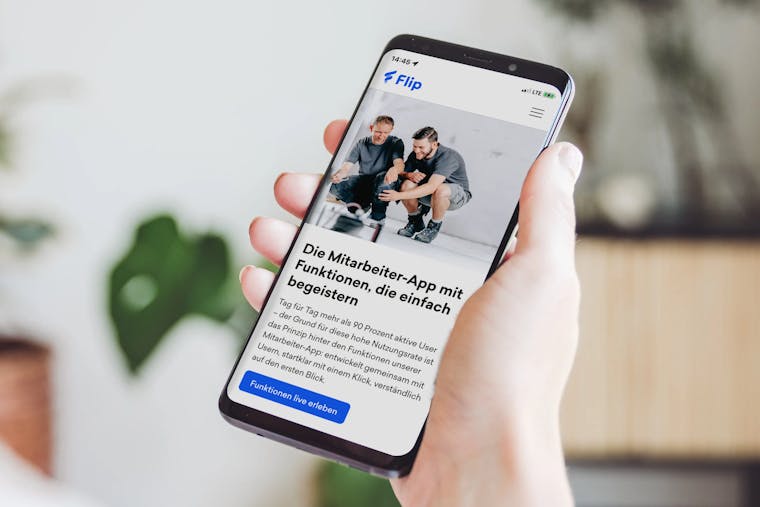A team of experienced strategists
B2B Agency
Marketing is undergoing rapid transformation. Due to the dynamics of digitalisation and, as a result, digital marketing, we all have more and more channels, content and tools to manage. The complexity and pressure to be efficient are both increasing in equal measure. We are your partner for sustainable growth and stability in a hyper-dynamic world. Benefit from our four decades of experience in many different B2B sectors. We can support you with interdisciplinary, data-driven international marketing.
Your contact

Steffen Ruess
Managing Partner
Ruess Group
Our industry experts understand your business in-depth

The power of the brand
Whereas in the consumer sector, the brand plays a role of up to 100%, in the B2B sector it ranges from 20% to 25%. Nevertheless, the brand and corporate design play a vital role in B2B as well. Quite simply because along with the cost-benefit analysis of a rationally planned purchase decision, the expertise of the brand ‘sender’ is decisive:
It enables a sense of security and orientation along the internal purchase decision process. And, of course, a respected and well-known name guarantees a certain credibility and authority. And ultimately, a decision that carries less risk. In other words: A decision in favour of a well-known name is most often one after which everyone can sleep well.
Giving a manufacturer a strong name in the industry and making its brand desirable is exactly what a B2B marketing agency can deliver. But what may sound straightforward here is in reality a task that only proven B2B specialists can successfully take on. After all, a packaging machine is much more complex – and more expensive – than a chocolate bar.
We know how your target group thinks
The better a B2B marketing agency knows the target group, the more precisely it understands their thinking, and the more accurately it can reach them. With this in mind, the very first step to be taken is a precise target group analysis with selective data collection to determine what leads to a positive decision by the targeted customer or customers.
To achieve this, the B2B marketing agency has to immerse itself head and shoulders in the respective industry and transition from marketing agency to industry insider. And this means fully identifying with its client’s product and culture – and understanding the market and its needs at least as well as they do.
A B2B marketing agency has to be a real sparring partner. In many companies, silo thinking and a “we’ve always done it this way” mindset are widespread. Certainly understandable. But it can’t work when the market has long since moved on and different customer benefits have moved into the foreground.
Identifying these together with the client is one of the most important tasks of a B2B marketing agency. And to then develop a strategy and a chain of arguments that demonstrably works in the market. That’s far from easy. What the client needs is a B2B agency with attitude and backbone.
A solid database is needed for optimised B2B marketing
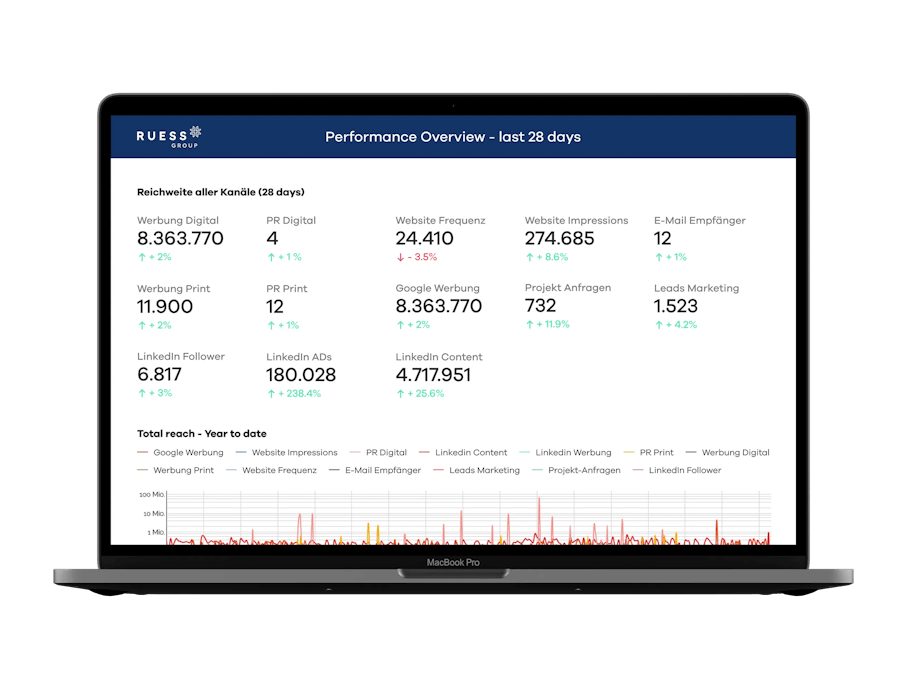
Complex decision-making and process structures determine the approach
The consumer goods market also experiences so-called planned purchases. However, the planning phases are much more manageable in terms of effort and time. In the B2B sector, several months or even years are often spent preparing for a significant purchase investment. Impulse purchases, which are often made by consumers, are rare in the world of B2B.
Also, most consumer decisions are made by one person. In the B2B sector, there are most often many decision-makers or even an entire team. This is where the knowledge and expertise of several experts come together to ensure the best selection.
How emotion complements ratio-based thinking
At this point it is important to debunk the old myth that B2B buyers always act and make their decisions rationally. A finding from consumer research can help here: The so-called “homo economicus” doesn’t actually exist. Instead, a multitude of unconscious processes and emotions play a large part in all decisions.
This also applies to the B2B sector. Certainly, a multitude of rational specifications from the company, such as the budget, are important here. Processes are also more structured and, since the decision-making process is usually distributed among several stakeholders, it is more organised and rational.
Nevertheless, the influence from third parties, past experiences, the supplier’s reputation, trust in the brand, the pride associated with the purchase of a high-quality and well-known product should never be underestimated. These are all factors that contribute to the fact that the task is not always solved in a purely logical manner.
Other influencing factors include the desire to make a sound purchase decision. In favour of a brand behind which all those involved in the purchase decision process can rally. With a provider that promises little to no risk. A brand that transfers some of its charisma to the company, from the operator to the managing director.
These are all soft factors that point to the importance of branding for B2B brands. And a strong indication that brands that evoke emotions have more success in the long term than a brand that communicates exclusively through rational factors such as functionality, price, adherence to delivery dates or longevity.
In this respect, B2B marketers needs to align their brand and their branding with both soft and hard factors, and manage it accordingly:
- How does the respective market work?
- How do the decision-makers think?
- What are their emotional needs?
- How pronounced is the need for security?
- What customer benefits do they need?
- Is price or quality the key decisive factor?
- What is the market situation in individual countries or regions?
- Where am I a market leader? Where not?
- In how many languages do I have to communicate?
- Using what tonality? Americans tend to be more outspoken than Europeans, for example.
- Through which channels do I need to communicate?
- What cultural sensitivities need to be taken into account?
- Are there any government regulations as in China, for example?
At home all over the world – international marketing
Knowing the industry is the first step, understanding the target group is the second. So far, so good. But what if you operate in a globalised world? When a brand’s essence and brand messages need to be positioned across continents and in completely different cultures?
When a global campaign won’t work everywhere, but the benefits, argumentation chains and imagery needs to be aligned with differing local expectations. This is exactly where an internationally experienced B2B marketing agency comes into play.
One who knows the respective markets, cultures and media channels. One who understands: What works. What is overpriced. Is a social media campaign needed or a trade fair campaign? Or both? Or maybe even something entirely different. These are all important decisions that cannot be made simply based on gut feel.
And this is why you need an internationally experienced B2B marketing agency that has the key relevant data for planning, implementation and controlling. To ultimately get 20% to 30% more from the budget. Marketing is all about learning, but the most valuable experiences to lead to a specific result are the ones the agency has had before.
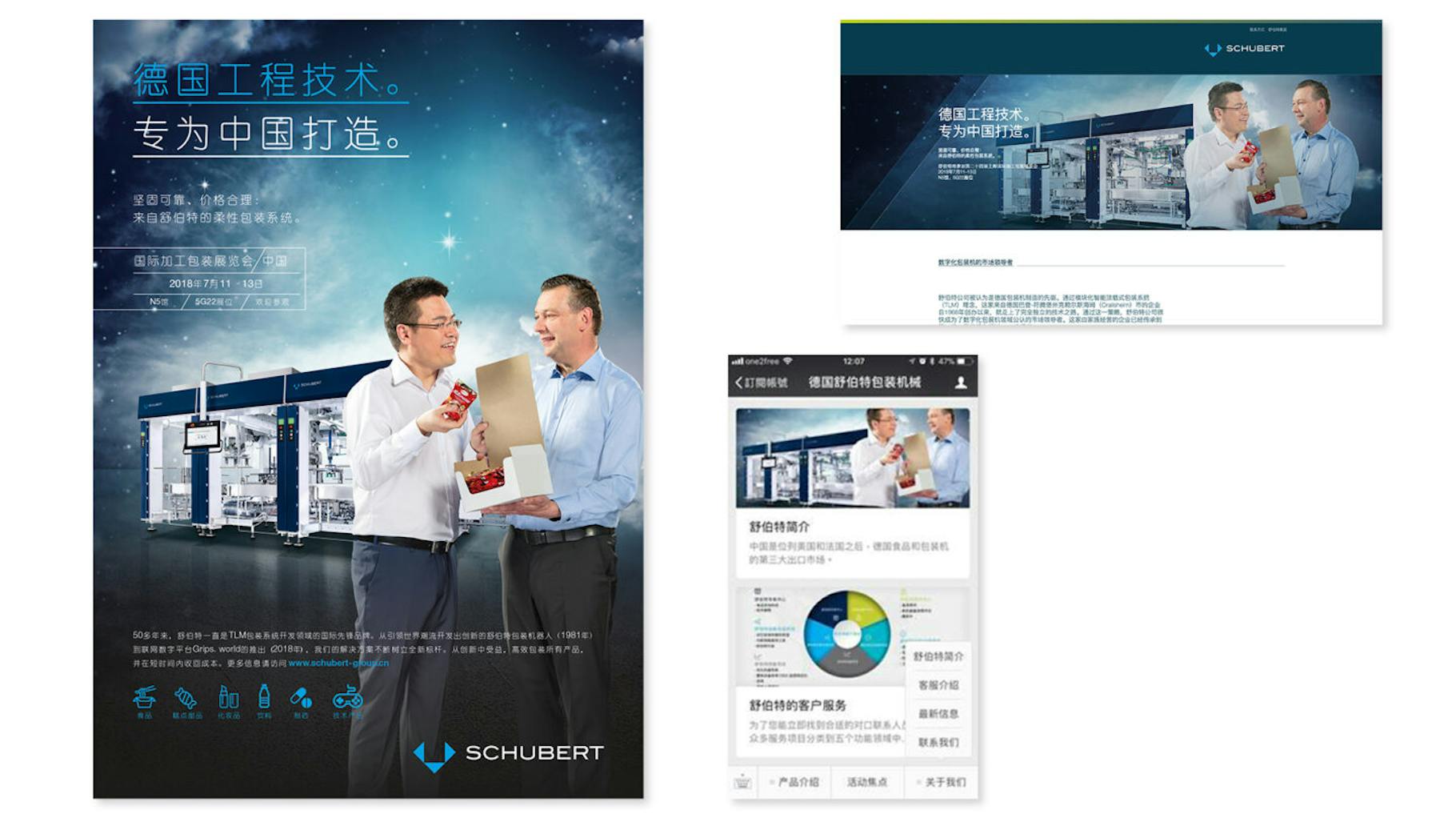
Marketing in China for packaging machine manufacturer Schubert
Designing the customer journey as a compelling one
Every lost contact with the potential customer is a missed opportunity. This is why a coherent and compelling customer journey is so important. Since there is no single customer journey, it is essential to identify the individual touchpoints (points of contact between the potential customer and the company), and to effectively populate them.
On the one hand, the agency’s experience helps, but on the other, additional analyses and target group surveys should never be neglected. Maybe the target group does its searches mainly via Google – which is certainly the norm in this day and age.
Then the company website should be search-engine-optimised and SEO and lead generation should be matched perfectly. How targeted is the first touchpoint? Often an explanatory video or a blog post is better than a comprehensive product data sheet or a white paper.
As a general rule, every touchpoint – be it an ad, a brochure, a social media post or a podcast – should be as customer-centric, informative and professional as possible. So that the potential customer is always addressed at each touchpoint in line with the brand values. This is why it is so important to:
- Analyse the target group’s customer journey.
- Identify possible touchpoints.
- Initiate the right measures.
- Know the potential customer’s information needs.
- And provide him or her with the relevant information every step of the way.
A good B2B marketing agency won’t think only in the short term, but in the long term. And it will also proceed iteratively from time to time. Accompanied by efficient marketing controlling tools that can measure what’s going on. So the result can deliver more for the client: More reach, more frequency, more leads, more project enquiries and more brand awareness.
Content may be King – but relevant content is Queen
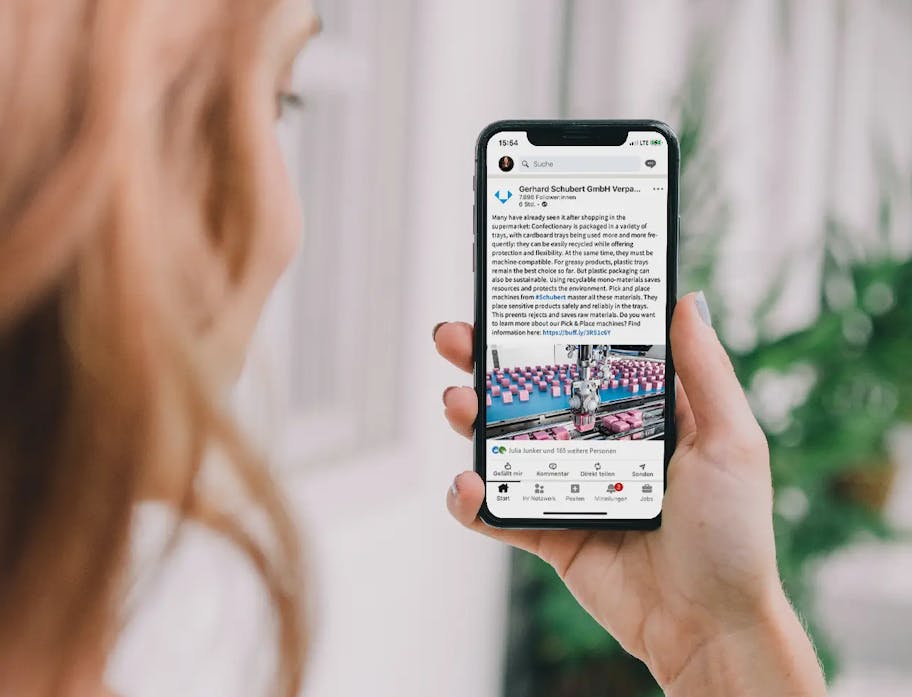
From analogue to digital marketing
Information needs are especially high in B2B
The need for information is very high, especially for complex products or larger purchasing volumes. After all, decisions involve a significant investment risk. Which is the important difference to B2C. For this reason, the buyers’ research and decision-making process also takes longer.
The expectations made on information and its depth are correspondingly high. The increased demands of B2B target groups call for new solutions and approaches in terms of information. The content needs to be easy to find, up-to-date, excellently researched and presented in a way that is simple and understandable.
Content that is of high quality and aims to “educate” the reader. This type of content enables companies to position themselves as experts – and establish authority, credibility and trust. Furthermore, Google appreciates high-quality content and “rewards” it with better rankings.
The website with added value as a business generator
Another difference to B2C is that a company’s website plays an even greater role in B2B. In the past, a company’s website essentially included an archive of press releases, concise information on the product range as a substitute for a catalogue and a quick way to contact the sales department.
Today’s B2B website should, above all, respond to the new demands of the target group. It needs to provide a clear, direct overview of products, solutions, their functionalities and their applications. Not ‘reeking’ of marketing, but instead, offering relevant information that makes the reader better prepared to make a decision.
In this respect, the website visitor’s need for information takes precedence over the company’s need to convey “loud” advertising messages. Values and visions, for example, can also be conveyed through users’ hands-on experiences or interviews with customers.
Formats that enable a high depth of information are especially well suited here. This is why the most common content formats B2B customers use for their research include case studies, white papers, webinars, e-books, and third-party and analyst reports.

Website design and development for packaging machine manufacturer Schubert
Social media for adults
Creating high-quality content in user-generated formats is important. And it is at least as important that the content be visible to the target group. Therefore, along with SEO as a website’s most important pull measure, push measures should also be used.
This is because B2B buyers search for information on a wide variety of digital channels, depending on their industry, their age, and their current phase of research. This also applies to social media channels, where touchpoints can be set up and information positioned to attract new customers.
The important thing to keep in mind is that social media has come of age as a point of contact. Between September 2017 and October 2018 alone, the number of social media users grew by 320 million. According to a CMO (Chief Marketing Officers) study, close to 70 percent more budget will be invested in social networks in the next five years.
This is why white papers no longer belong exclusively on the company website, but should be prepared in formats that can be consumed quickly and distributed via social media. As a graphic or post, for instance: “Five facts about the new solution”, “Three reasons why this product is easier to use”, or “This is how sustainable our latest achievement is”.
This way, content can be adapted to the media in which it is placed and is perceived much less as advertising and more as a welcome aid to decision-making. Especially B2B content with sophisticated information content can become subtle, convincing, credible and work in the client’s best interest.
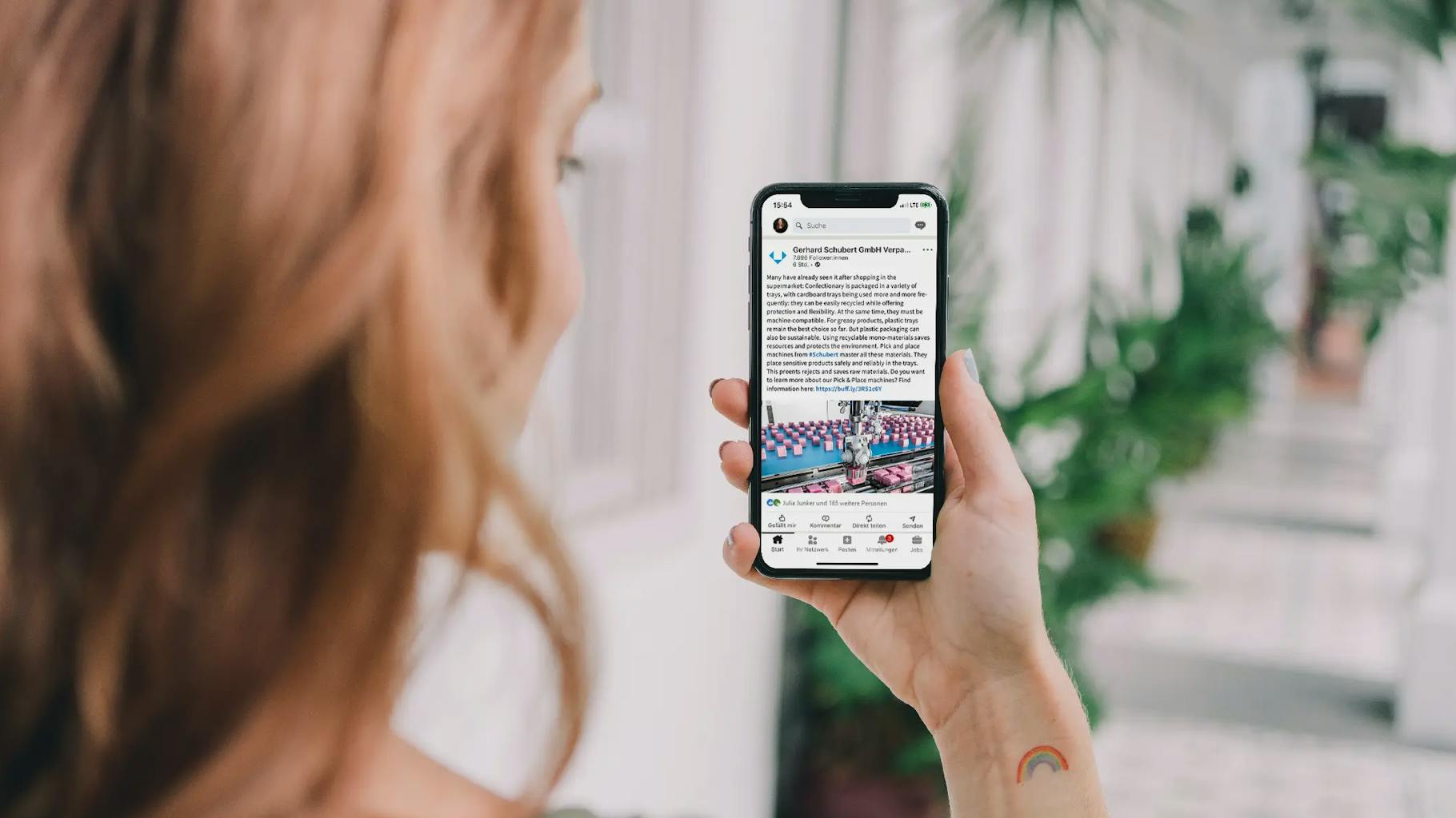
In a nutshell:
Your B2B marketing agency has to do a lot for you. It needs to know a lot, have even more experience, be willing to learn about the most complex markets and communication channels around the world and be ready to go the distance: In other words, to be fully at home in the many and most important markets and communication channels. We at the Ruess Group are.
Your B2B marketing agency is facing big challenges:
- The target groups are small and can usually only be reached in niches.
- Sometimes there are only a few dozen of them.
- Often in different national markets.
- With different cultures.
To achieve this, it has to bring a lot to the table:
- It needs to know how to reach the target group.
- It needs to have extensive industry know-how.
- Have a lot of experience in the global field.
- Know what works in the respective countries.
- Understand which communication channels work how and cost-effectively.
- Avoiding waste.
- Because expensive shotgun marketing is not a solution.
Your contact person
Send us your questions and your objectives. We will be happy to prepare extensively for a first meeting with you.

Steffen Ruess
Managing Partner
Ruess Group





